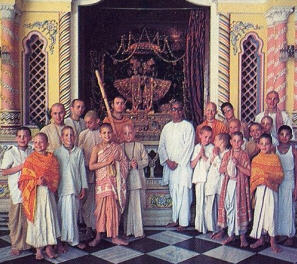
We all know that education is for training tomorrow's leaders. But today's schools are little more than training grounds for criminals. Last year's U.S. statistics bear witness to the horror: 100 school murders, 17,000 armed robberies, 200,000 aggravated assaults against teachers, 2 70,000 school burglaries, and $600 million lost to vandalism. So where are we going to get tomorrow's leaders? From among these students at ISKCON's new academy in Vrndavana, India.
So many of today's social ills persist simply because we lack qualified leaders. Recently, of course, we have even seen many highly-posted political leaders exposed as complete incompetents. But then, if our society is materialistic and our education is materialistic and our leaders and teachers are all materialistic, how can we expect to produce a generation of spiritually strong adults people competent to solve today's crises? True, we may hold technological know-how and university degrees in high esteem. But these things can't take the place of spiritual strength and purity of character.
If a young boy has no spiritual training, how can he have a sense of morals or know anything about God? And if such a spiritually ignorant person gets to be a leader, how can we expect anything but a criminal? So when His Divine Grace A.C. Bhaktivedanta Swami Prabhupada came to the West, he brought the gurukula, "the school of the spiritual master" the school for real leaders.
Srila Prabhupada's first American disciples were eager to help him start the gurukula: we wanted our own children to get training in spiritual life from the very beginning. Most of us had come to Krsna consciousness only after twenty years of being misled. We didn't want our children to follow us in watching all kinds of nonsense on television, or in being chronically addicted to liquor, drugs, and cigarettes, or in growing up with a taste for mere temporary happiness and no knowledge of the next life. Also, we wanted our children to escape the disgust that cheating religious and political leaders had produced in us. So under Srila Prabhupada's guidance we started a school whose enrollment grew in a few years to more than a hundred students. Recently, I visited this school (in Vrndavana, India, its new location) and spoke with the teachers and students.
Talking with the Teachers
First, I interviewed Jagadisa dasa, ISKCON's minister of education.
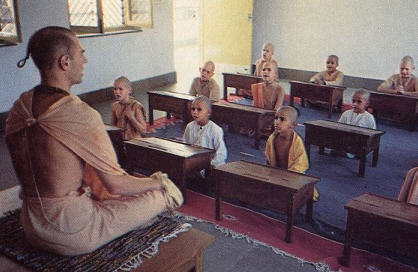
Yasodanandana Swami
Back To Godhead: What is the purpose of gurukula, the school of the guru?
Jagadisa dasa: Srila Prabhupada explains that in the Vedic culture, when a boy turns five he should go to the ashrama of the guru and gets training. Then when he's an adult he'll have a solid spiritual background.
The Vedic scriptures state that human life is not meant for working hard like the animals, just to satisfy the senses. Human life is meant for practicing austerity, by which we can escape the miseries of material existence. The Vedic scriptures emphatically state that no one should become a teacher, mother, father, or government leader unless he can free those under his charge from birth and death. So here in our Gurukula we are fulfilling our responsibility as teachers and parents: by training our Society's children in the principles of Krsna consciousness given to us by Srila Prabhupada, we're not only freeing the children from birth and death, but we're also helping them reach the ultimate goal of life love of God.
BTG: Is your moving to India a rejection of Western civilization? And if so, what is superior in Indian civilization?
Jagadisa dasa: As in all of ISKCON, ours is a rejection not of Western civilization but of materialistic civilization. We are certainly not opting in favor of modern Indian culture. We aren't interested in any materialistic culture-Western or Eastern. We live according to the Vedic scriptures, which recommend simple living and high thinking.
Of course, India is the home of the ancient Vedic culture, which is founded on spiritual values. Although that heritage has been abandoned now (chiefly because of the British influence), India is still the best place in the world for spiritual life. Here in Vrndavana no one will complain that we are chanting Hare Krsna or wearing traditional garb.
BTG: Since India is the home of your culture, will the children stay here after growing up?
Jagadisa dasa: Not necessarily. The Krsna consciousness movement is also known as the sankirtana movement, which means that our mission is to spread the chanting of the holy name of Krsna to every town and village in the world. This is the order of Lord Caitanya, an incarnation of Krsna who appeared five hundred years ago in Bengal, and our spiritual master Srila Prabhupada is part of the disciplic succession of pure devotees coming from Him. Lord Caitanya introduced the congregational chanting of the Hare Krsna mantra, and He ordered His followers to chant it publicly to give everyone a chance to come to God consciousness. So our missionary work especially the chanting of Hare Krsna and the distribution of Srila Prabhupada's books must go on in both the Western and Eastern countries. But as far as educating our children goes, we are doing that wherever we find it most safe. After the children are trained, they can join in the missionary work.
BTG: How did you get this new place?
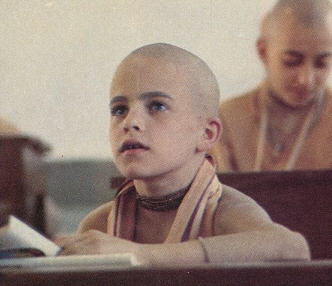
Dhiroddhatta Dasa The Gurukula's First Student
Jagadisa dasa: The land was donated by a good friend, Bishangar Dayal, who wanted to see a gurukula in Vrndavana. And the construction was funded by our Society and private donations. We now have facilities for five hundred students. We also have a qualified staff, headed by our principal Dr. Onkar Sharma, who is very experienced in education. All our teachers have teaching certificates and several years of practical experience.
Next, I interviewed Dr. Onkar Sharma, the principal of the Gurukula.
BTG: Dr. Sharma, you'd had a lot of experience in the educational field, both in America and in India, before you began teaching at our Gurukula here in Vrndavana. Can you tell us how you came to be associated with ISKCON?
Dr. Sharma: In 1973 I retired and came to Vrndavana to stay. One day I saw some very handsome devotees from the West chanting Hare Krsna in the market. I was much impressed. Then I visited the devotees and one brought me to see the foundation for the present Krsna-Balarama temple and Gurukula school.
At that time I had plans to build my own ashrama. So I left Vrndavana and started an ashrama in Hardwar [a holy city at the foot of the Himalayas]. But I wasn't satisfied with the atmosphere there it was not very spiritual. So, in 1975 I returned to Vrndavana. It was in April of that year that I saw the opening of the Krsna-Balarama temple.
After the ceremony I requested to see Srila Prabhupada, and I was brought into his presence. We talked for some time, and when he heard that I had been a principal for many years, he asked me what my thinking was on gurukula. I said, "A gurukula should be run on the old pattern, not the modern one. It should be based on the original Indian model."
As I spoke with him, Srila Prabhupada listened to me very calmly and quietly. He was very pleased at my description of the old educational system. Then he asked me, "Why don't you become the principal of our Vrndavana Gurukula? You be the principal," he said, "I'll give you full charge." He also gave me a personal copy of his Bhagavad-gita As It Is.
BTG: How does an old-style gurukula education differ from a Western one?
Dr. Sharma: The main purpose of a gurukula is not, as in your colleges in the West, to obtain a degree and employment. The goal is more religious. Actually, a boy is allowed to stay in school up to his twenty-fifth year, studying the Vedas and Upanisads. In this way he becomes a first-class Vaisnava [devotee of Krsna].
BTG: How does this Vrndavana Gurukula compare with other gurukulas in India?
Dr. Sharma: This is the most authentic gurukula because it is the most Vaisnava. It emphasizes Vaisnava programs, and it devotees more than six hours a day to religious studies.
BTG: How are the Western boys adjusting to this old-style gurukula?
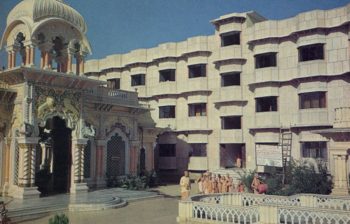
ISKCON Gurukul
Dr. Sharma: Oh, they have adjusted nicely. They are happy. They are always inquiring. They are fully adjusted to the Indian climate, to the customs of the local people to everything.
Finally, I had a talk with Rupa Vilasa dasa, who holds a masters degree in education from the University of Florida. He has been with the Gurukula since it began in America, and his experience is particularly valuable, since it includes living with the boys in their dormitory and guiding them both in their classroom activities and in every aspect of their daily lives, including cleaning, duties, recreation, worship, and meditation.
BTG: Rupa Vilasa, how do you feel the Gurukula here in Vrndavana compares to the way it was when it was in the West?
Rupa Vilasa: It's much nicer here. Here in Vrndavana Krsna consciousness is the rule there is no opposition while in the West the whole culture is opposed to Krsna consciousness. Western culture is sinful the people engage in animal slaughter, intoxication, and other such degrading activities. Of course, India has fallen far from her original Vedic standard, but there is still a favorable atmosphere here.
I'll give you an example. In the West, when we went out on a walk we ran the risk of being spit at and jeered. But here in Vrndavana, when we go out on our daily excursion all the people encourage us. Everyone is favorable. There is nothing odd in having a shaved head here. In fact, many of the people look just like us. In India, and especially in Vrndavana, our Vaisnava style of living is still accepted as the purest way of life.
BTG: What change do you see in the boys that came with you from the West?
Rupa Vilasa: Well, they're more satisfied and peaceful, and their lives are simpler. For example, in America we used the laundromat, but here the boys wash their own clothes. This simple responsibility helps build their character.
Their health is better, too. For most illnesses they simply fast one or two days and drink water and they get well. But in the West I was always taking them to the hospital or giving them medicine.
But the main improvement I see is spiritual. The boys have become spiritually strong. If something goes wrong, they don't take it as an emergency. They're more enthusiastic to chant Hare Krsna. That's because in Vrndavana everyone is chanting. Here we may have fewer material conveniences, but on the whole the boys are more peaceful without the hectic atmosphere they had in the West. In the West you have so many distractions, but here it's easier for the boys to be peaceful and chant Hare Krsna.
BTG: Can you tell me something about why Vrndavana is such a special land for devotees?
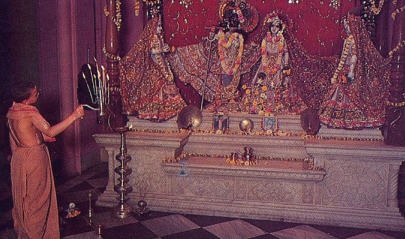
Rupa Vilasa: Yes. Vrndavana is the land where Lord Krsna displayed His most attractive pastimes. Most of our boys have been hearing about Krsna since they were three or four years old. So now that they've come to Vrndavana, they can see the very things they've heard about from the scriptures: the Yamuna River, the groves, the cows and peacocks. In fact, for a devotee, Krsna and the spiritual world actually become manifest here in Vrndavana. So it's not surprising that all the boys have become much more attached to Vrndavana than they were to their old home. The scriptures confirm that anyone who becomes attracted to the beauty of Vrndavana loses all interest in ordinary landscapes within the material world.
BTG: People in the West sometimes object to our sending our children here to an exclusive training center. These critics claim that we want to make the children just like us and that we neglect to put them in touch with reality.
Rupa Vilasa: Actually, the children are more in touch with reality here than in the West. Take death, for example; that's certainly a reality. Several times the boys have seen dead bodies taken on procession and cremated. When I ask them to explain what they're seeing, they say, "The body is being burned because the eternal soul is no longer there. The soul is the real person, and he has already gone back to Godhead."
I can give you another example. Srila Prabhupada often compares particularly lusty people to stool-eating hogs. Here in Vrndavana the boys see stool-eating hogs daily, and the boys understand that they are the epitome of degradation. They understand that within that abominable hog body is a spirit soul who thinks he is enjoying the most, while in reality he is suffering the most. So they see the pitfalls of materialistic life.
Another example Srila Prabhupada gives is the ass loaded down with huge bundles by the washerman. He works hard all day so that in the evening his master will feed him some grass. He can't see that he doesn't have to work for his master and that there is an endless supply of grass growing all along the roadside. That's the way it is with people who don't know that their real master is Krsna: they work hard day and night for material necessities just like the ass. So it seems to me that if anyone says these Gurukula boys are not in touch with reality, that is a fantasy.
BTG: You and Jagadisa both mentioned austerity. Could it be fairly said that there's too much austerity here in India that by coming to India you've overdone it in your attempt to impose austerity upon the children?
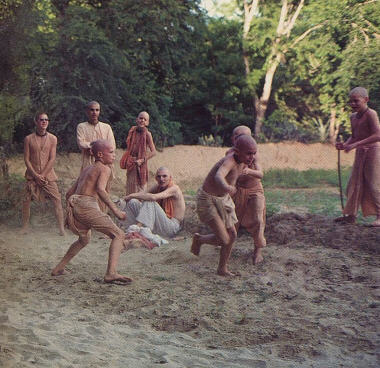
Rupa Vilasa: No. We don't force the boys to undergo harsh austerities. Of course, by the artificial Western standards their lives do seem simple and austere, but the boys are all very healthy and happy.
Actually, the building here is nicer than the one in the West; it's a new three-storey complex with spacious living quarters. We have modern showers and toilets. And the prasada [vegetarian food offered to Lord Krsna] is excellent.
BTG: What about general cleanliness and personal hygiene?
Rupa Vilasa: We do our own cleaning; that's a brahminical quality. Srila Prabhupada said that the boys should clean their own clothes and eating utensils. "Cleanliness is next to Godliness."
Here the boys are more physically active than they were in the West, and they get sick less. They swim and wrestle every day. They're just happier. In the West we used to go to a nearby lake, and we'd see people floating in life rafts and drinking beer. Sometimes someone would speed by in a motorboat and shout at us or throw something. But here I take the boys to the Yamuna River every day. And what do they see? They may see some old lady chanting Hare Krsna on her beads, or they may see a ricksha driver. But in Vrndavana even a ricksha driver is more pious than some big Western aristocrat.
BTG: What about the children's relationships with their parents? Are they completely cut off here in India?
Rupa Vilasa: No. They often get packages from their parents. They like to get letters and hear what's going on in the West. But they're not preoccupied with their families. They have a full life and a full schedule here, though they're very glad to see their parents when they come.
A Leader To Look Up To
The boys have a day-to-day guide and friend in headmaster Yasodanandana Swami. In his extensive travels throughout India, Yasodanandana has addressed large gatherings and talked with local scholars on the science of Krsna consciousness. And though an American, Yasodanandana has won wide respect for his erudition and strict spiritual discipline. As the title "Swami" signifies, he is one of a select number of disciples to whom Srila Prabhupada has given sannyasa, the highest order of spiritual life awarded for scholarship and purity. In other words, Yasodanandana Swami teaches both by what he says and by what he does.
Although a sannyasi usually spends his time traveling and preaching, Srila Prabhupada specifically asked Yasodanandana Swami to live with the Gurukula boys and tutor them. This way they benefit from both his academic instruction and his personal example. So while their counterparts in the West are idolizing some sports hero, rock star, or local gang leader, the Gurukula boys look up to Yasodanandana and hope to be like him some day.
A sannyasi stays free of family life just to devote all his energy to preaching Krsna consciousness to the larger family of mankind. Yasodanandana Swami hopes that in this respect some of the boys will follow his lead. But thanks to the spiritual background they gain at the Gurukula, even the students who marry will go on learning and speaking about the science of Krsna consciousness.
Yasodanandana Swami says that one of the most important qualifications of a spiritual leader is conviction, and that the Vrndavana Gurukula is the best place in the world to develop it. "In India it's very easy for these children to become convinced that Krsna consciousness is genuine. In the West, where Krsna consciousness seems to be something new, this conviction doesn't come so easily. But here in India, where the roots of Krsna-conscious culture go back thousands of years and especially here in Vrndavana, where everyone is practicing (to some extent) the devotional principles this conviction becomes strong. With this strong conviction these children will make solid spiritual leaders and benefit all humanity."
